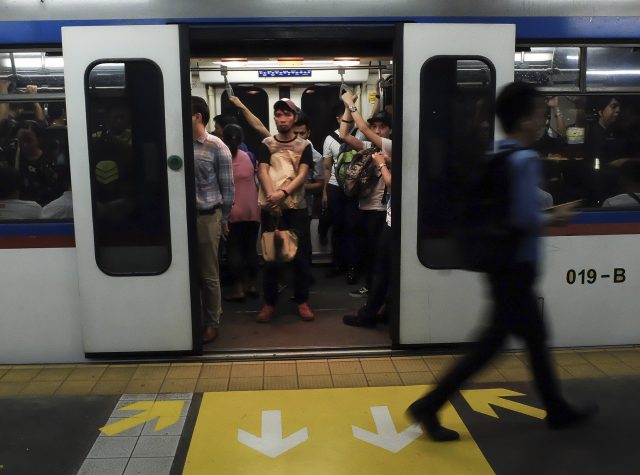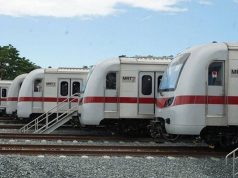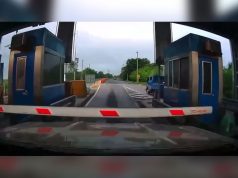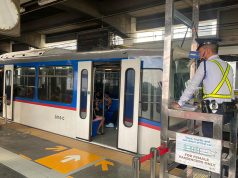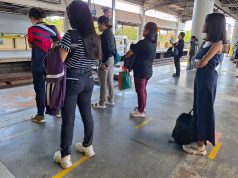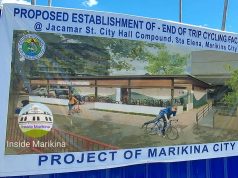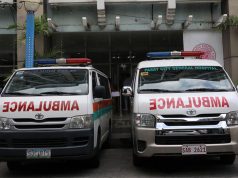MANILA – The Department of Transportation (DOTr) on Wednesday refuted claims by the maintenance contractor of the MRT3 that it is being denied payments, saying that the government is withholding payments because the company has failed to submit necessary documents.
DOTr Undersecretary for Railways Cesar Chavez explained that the Philippine government is withholding the payments to contractor Busan Universal Rail Inc. (BURI) until it completes the submission of documents and reports as required under the maintenance contract and by government accounting and auditing rules and regulations.
BURI’s lawyers had claimed they filed suit against Chavez with the Ombudsman for the withheld payments.
Chavez emphasized: “We are not denying payments to BURI but only withholding them until the company submits all documents necessary before any payment by the government is released to them. It is based on contact, and government policy on public accountability.”
Chavez provided a detailed explanation for the withheld payments in a letter to BURI’s legal counsel, Atty. Redentor S. Roque, last June 6, 2017.
Chavez said that the DOTr has undertaken financial sanctions against BURI because of its poor record in providing maintenance and safety checks on MRT trains. The decision to withhold portions of BURI’s billings is in accordance with contractual provisions, as well as existing pertinent government accounting and auditing rules and regulations.
Chavez told Roque that “the matter at hand is withholding, and not a denial of payments, nor an imposition of penalty or liquidated damages.” Chavez reiterated that “the withheld amounts can be released to BURI upon compliance with provisions of contract and the government policies on public accountability.
Chavez further explained that he and BURI are both “under public accountability.” Thus, “any amount that shall be disbursed with respect to the subject contract.” Chavez also said that he is only fulfilling his duty and obligation “to see to it that the best interests of the government are secured, and that the government is not short-changed.”
Earlier, the Commission on Audit (COA) expressed support for the DOTr’s action, saying, “We are concerned that the unperformed services and unprocured spare parts and consumables may have a negative impact on the services rendered by the contractor. Although proportionate deductions were made from the monthly payments to the contractor, these could not outweigh the adverse effects on the safety of the riding public.”
RIDICULOUS ‘GRAFT CHARGES’
Chavez was hit with talk of graft charges by BURI.
“How can I be charged with graft when I am only protecting public funds?” Chavez asked. “Isa sa gusto nilang bayaran ng DOTr sa kanila ay ang Logic Vehicle Unit. P4 million ang halaga. Nabili nila ito sa Diamond Pearl, na pag-aari ng pamilya ni Marlo De La Cruz. Ang LVU ay bahagi ng Automatic Train Protection (ATP), or onboard signaling. Ang original equipment manufacturer ng signaling system sa MRT ay Bombardier. Walang Certificate of Origin at Factory Inspection Report na nakasama sa billing ng LVU. So saan galing ito? Hinihingi muna natin ang Certificate of Origin kaya na-withheld ang payment nito.”
Chavez reiterated: “Pag kumpleto ang mga dokumento na requirement ng COA, binabayaran natin. Pag hindi, hindi rin natin binabayaran [When documents required by COA are complete, we pay promptly. When they’re not, we don’t pay].”
He added, “Bakit kailangan masinop sa pagsusuri ng biling? Para matiyak na original ang spare parts, at hindi rin galing sa ‘cannibalized’ o kinuha lang na piyesa sa ibang bagon. Ito ay para sa kaligtasan ng mga mananakay [Why are we meticulous in checking the billings? To ensure that spare parts are original and did not come from or were cannibalized from other older coaches. This is for the riding public’s safety].”
BURI’S ‘POOR TRACK RECORD’
BURI has been insisting on claiming a total of P59 million in withheld payments from the DOTr covering the period September 2016 to November 2016 DOTr pointed out, even though “it really wasn’t able to fulfill its obligations.”
Best proof of BURI’s failure to provide the service it was commissioned to do, per DOTr: In 2016, the MRT-3 suffered 649 service interruptions and passenger unloadings.
These continued in 2017, punctuated with train derailment incidents in April, May, and June that severely affected train operations. The convenience and safety of the public was totally neglected.
Upon investigation, the DOTr discovered that these daily malfunctions were caused directly by poor or non-existent maintenance work. They cannot be blamed on design- or rail-related issues.
“BURI failed to regularly provide 20 sets of RELIABLE and SAFE trains during peak hours. The company may claim that it deployed 20 trains during peak hours, the service interruptions and derailments that ensued proves that the said trains could not be classified as reliable or safe,” added DOTr.
According to DOTr, BURI also failed to buy necessary spare parts needed for MRT-3 repair and maintenance works. “Naturally, this affected the conditions of the trains. In line with this, BURI has also been remiss in doing up-to-date maintenance, which may explain why its repair records and data files — as well as materials management and historical documentation — are not organized in a structured and readily useable system.”
Finally, said DOTr, “BURI also failed to ensure the safety of its maintenance staff. They were not provided with helmets, safety vests, and facial masks.”

